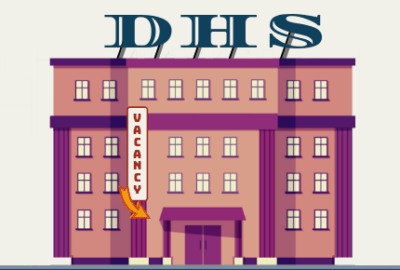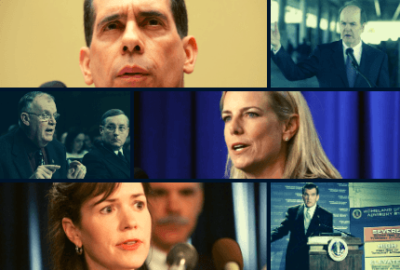
With bipartisan concern over DHS leadership changes, overseers urge Congress to focus on long game
Amid bipartisan concern for recent leadership changes at the Department of Homeland Security, oversight experts advise Congress to make structural changes to staff...
In overseeing the ongoing musical chairs of top leaders at the Department of Homeland Security, the agency’s former inspector general and government’s comptroller general on Wednesday advised Congress to focus on broader, structural changes lawmakers could make to address long-term, systemic challenges that DHS has been grappling with since its creation.
At least 15 top positions at the department are either vacant and held temporarily by acting officials — or have one person simultaneously filling multiple jobs.
But leadership vacancies are old-hat for DHS at this point. They’re not even that shocking for Gene Dodaro, comptroller general for the Government Accountability Office.
“I would say it’s in the upper areas of concern,” he told the House Homeland Security Committee this week, when a member asked whether the recent string of vacancies were especially shocking. “I’ve been at GAO for 46 years, so I’ve seen a lot of things.”
In addition, at least 50 Senior Executive Service positions are also vacant at DHS, according to Bennie Thompson (D-Miss.), chairman of the House Homeland Security Committee.
“At the best of times, DHS is an unruly and difficult to manage organization, and we are not in the best of times,” John Roth, the department’s former inspector general, told the House Homeland Security Committee Wednesday at a hearing on the agency’s leadership vacancies. “The nature and extent of senior leadership vacancies in the department is a cause for concern, and such pervasive vacancies significantly hamper the department’s ability to carry out its all-important mission.”
Even when the secretary or deputy secretary’s office was fully staffed, they were simply too small to be aware of or handle DHS’ systemic issues, Roth said. Any progress that was made, he added, was made because of the sheer will of a small staff, but that approach isn’t sustainable.
Roth described DHS as a “holding company” for its components, many of whom brought their own management and morale challenges to the department when it was created in 2003. It was a challenge he experienced first hand as the department’s inspector general before he retired in November 2017.
“My experience in both administrations was that I would go and brief the secretary and deputy secretary on various findings that we had, and they were completely caught by surprise. They didn’t have the ability and the staff and the structure to get the kind of reporting that they needed to be able to look at problems and fix them. That’s a personnel issue, a staffing issue and a structural issue that can be fixed by this Congress.”
Members of the House Homeland Security Committee largely agreed the vacancies were a concern.
“Acting is not as good as having someone in place,” Rep. John Katko (R-N.Y.) said. “I think we can all agree on that.”
But some members questioned at times why the committee had even met to discuss the vacancies, especially if they, as members of the House of Representatives, physically don’t play a role in confirming presidential appointees that may fill empty DHS positions.
But both Roth and Dodaro tried to suggest how the House committee could help DHS address systemic and long-term management challenges.
“There needs to be a chief management officer position that transcends administrations,” Dodaro said. “These efforts to focus on fundamental management weaknesses are not going to get solved in a short period of time. In fact right now, they’re targeting these financial management system improvements to not be in effect until 2020 and beyond. Same thing with morale, it needs sustained attention.”
Dodaro said agencies who have leaders with five-year terms, such as the IRS, Social Security Administration and Federal Aviation Administration, have often been more successful at implementing long-term visions for employee engagement, budgeting and planning.
It’s partly why DHS has long been at the bottom of the Federal Employee Viewpoint Survey and Best Places to Work rankings, even despite recent but minor improvements.
“If you have a systemic and pervasive morale problem, employees are going to look to the leaders for fixing the problem,” Roth said. “If that leader is in a temporary position, he might be stymied or she may be stymied from being able to engage in a long term fix.”
Roth and Dodaro suggested lawmakers consider making structural changes to their oversight of DHS.
Former DHS Secretary Jeh Johnson had long bemoaned the 92 to 108 different committees and subcommittees who had jurisdiction over the department, but Dodaro and Roth urged members to use those authorities to their advantage and keep constant pressure on the agency.
“Oversight works. I’ve seen it firsthand,” Roth said. “Letters get answered. Things get done in preparation for hearings that would not otherwise happen.”
Thompson said his committee, along with the Senate Homeland Security and Governmental Affairs Committee, sent a letter to DHS leadership back in late March asking about the status of the quadrennial homeland security review, which is a year late.
The quadrennial review will help DHS articulate and implement concrete plans to unify the 22 individual components, Dodaro said.
Copyright © 2025 Federal News Network. All rights reserved. This website is not intended for users located within the European Economic Area.
Nicole Ogrysko is a reporter for Federal News Network focusing on the federal workforce and federal pay and benefits.
Follow @nogryskoWFED
Related Stories
DHS leadership shakeup further delays progress on long-standing management issues




